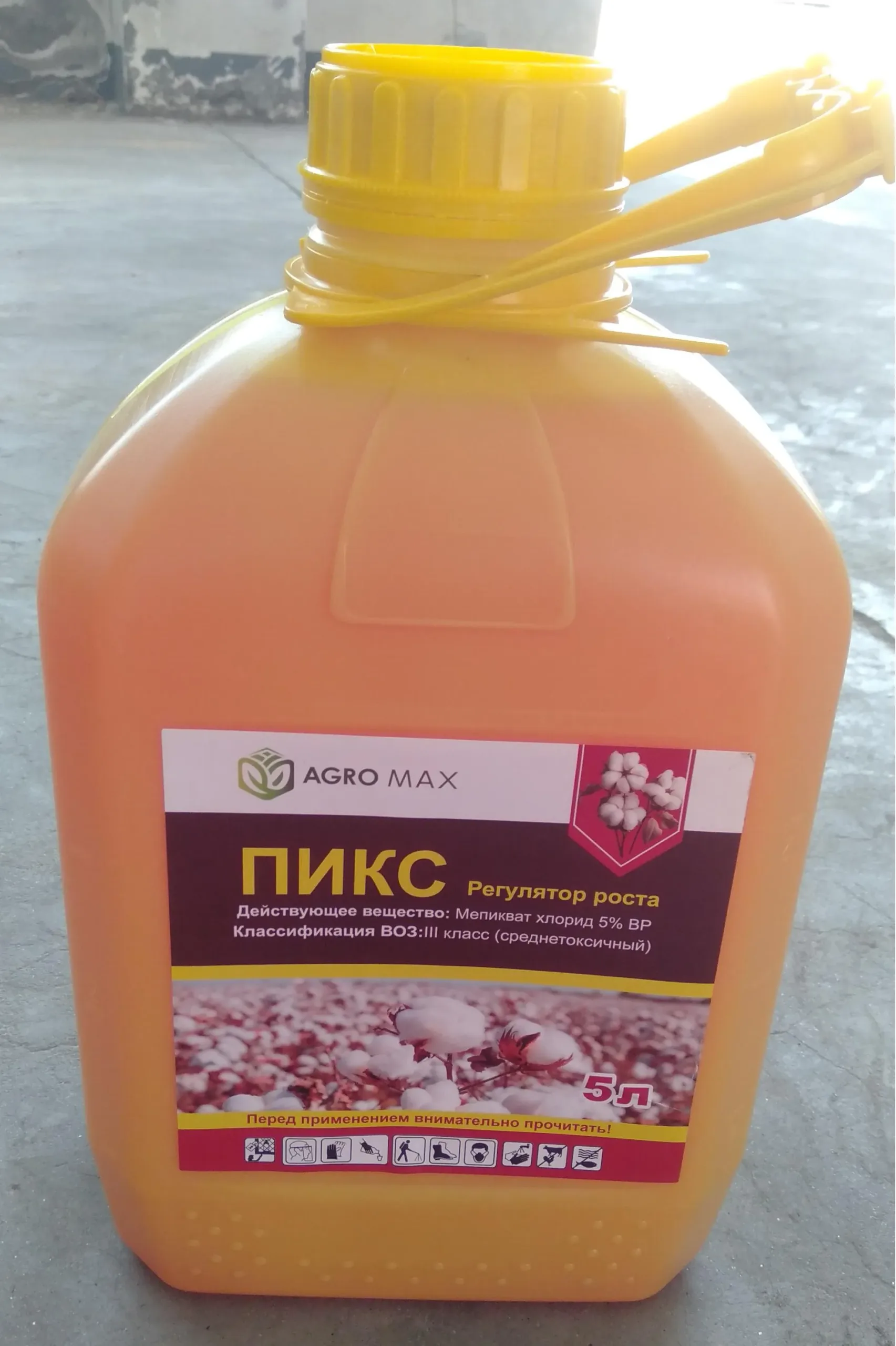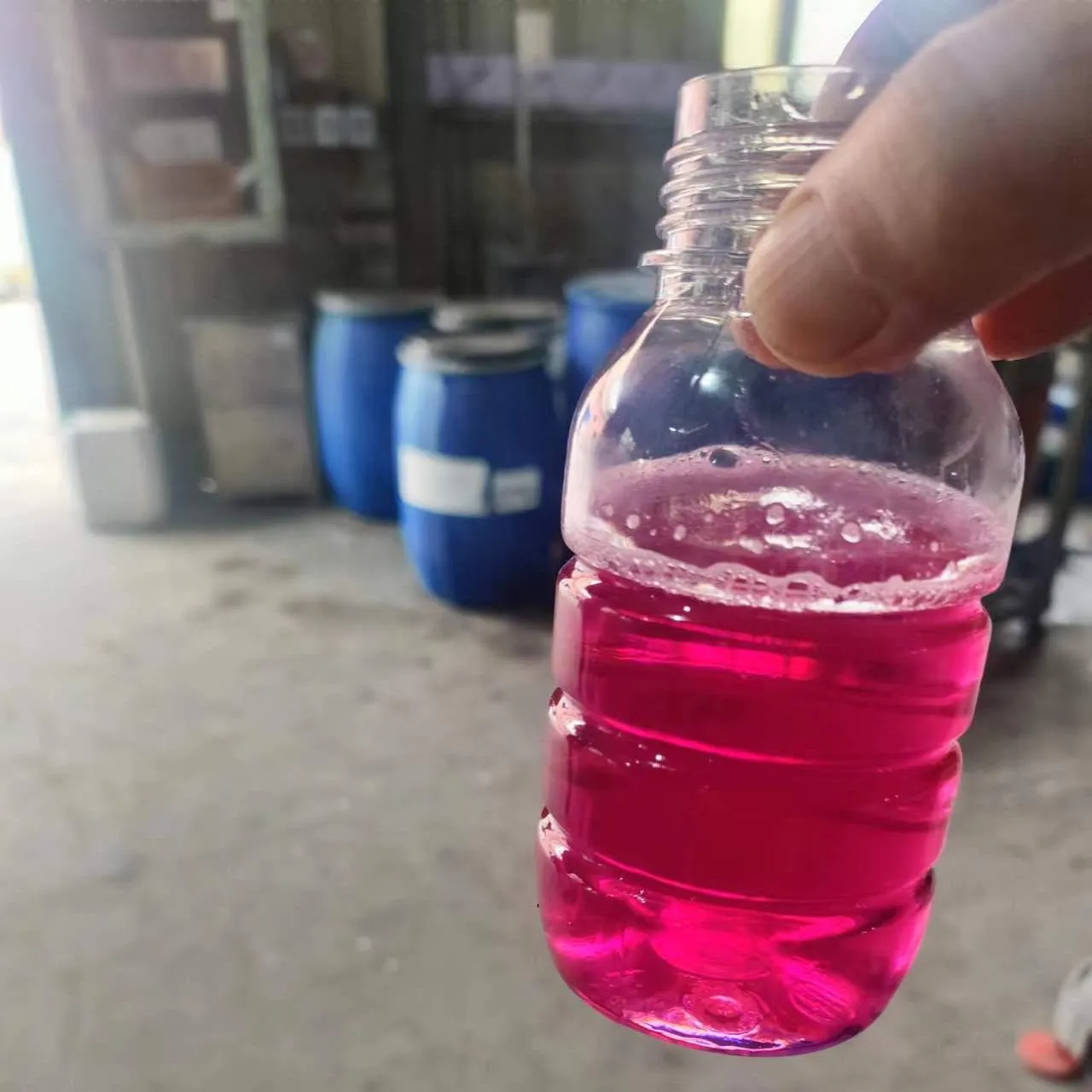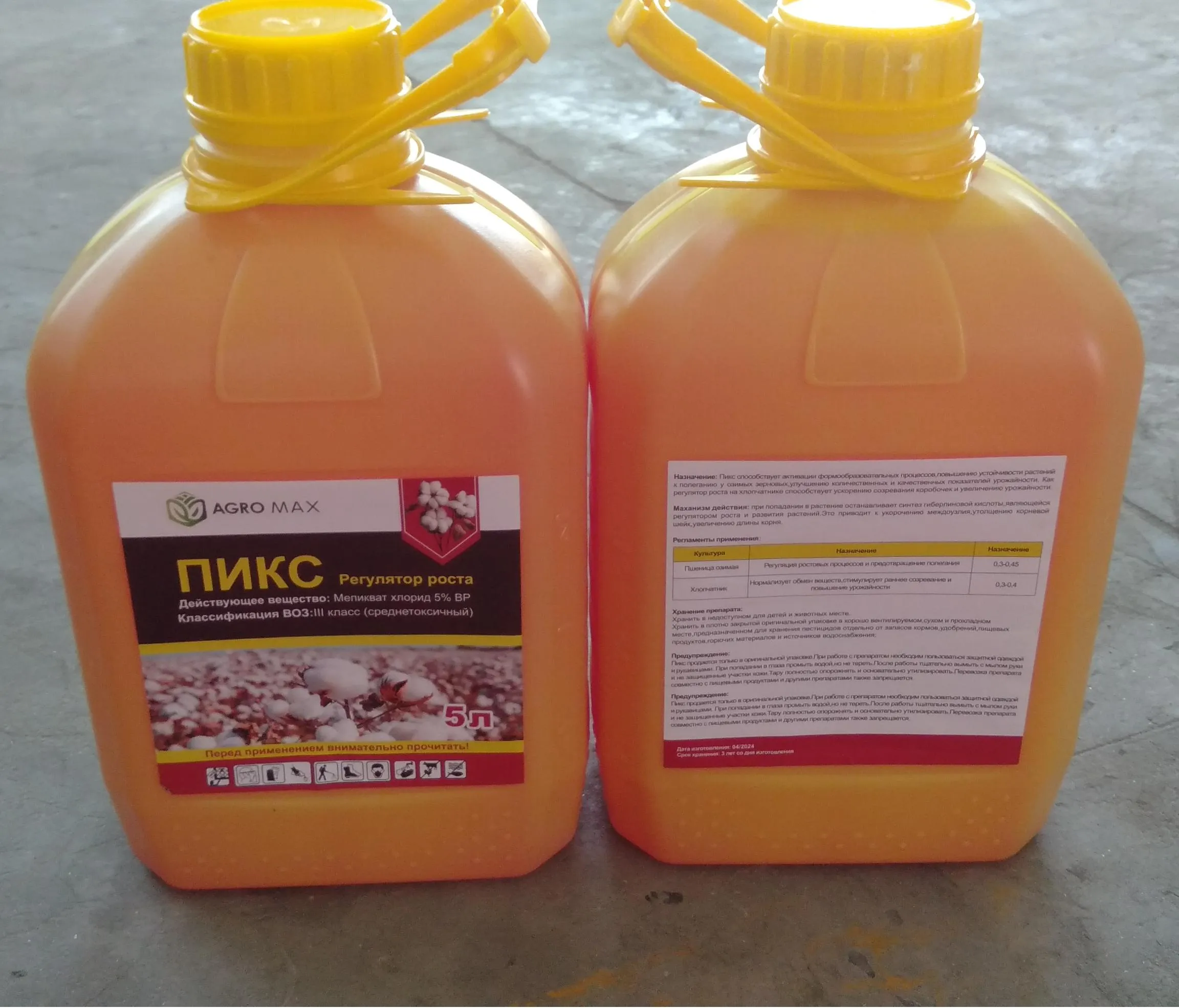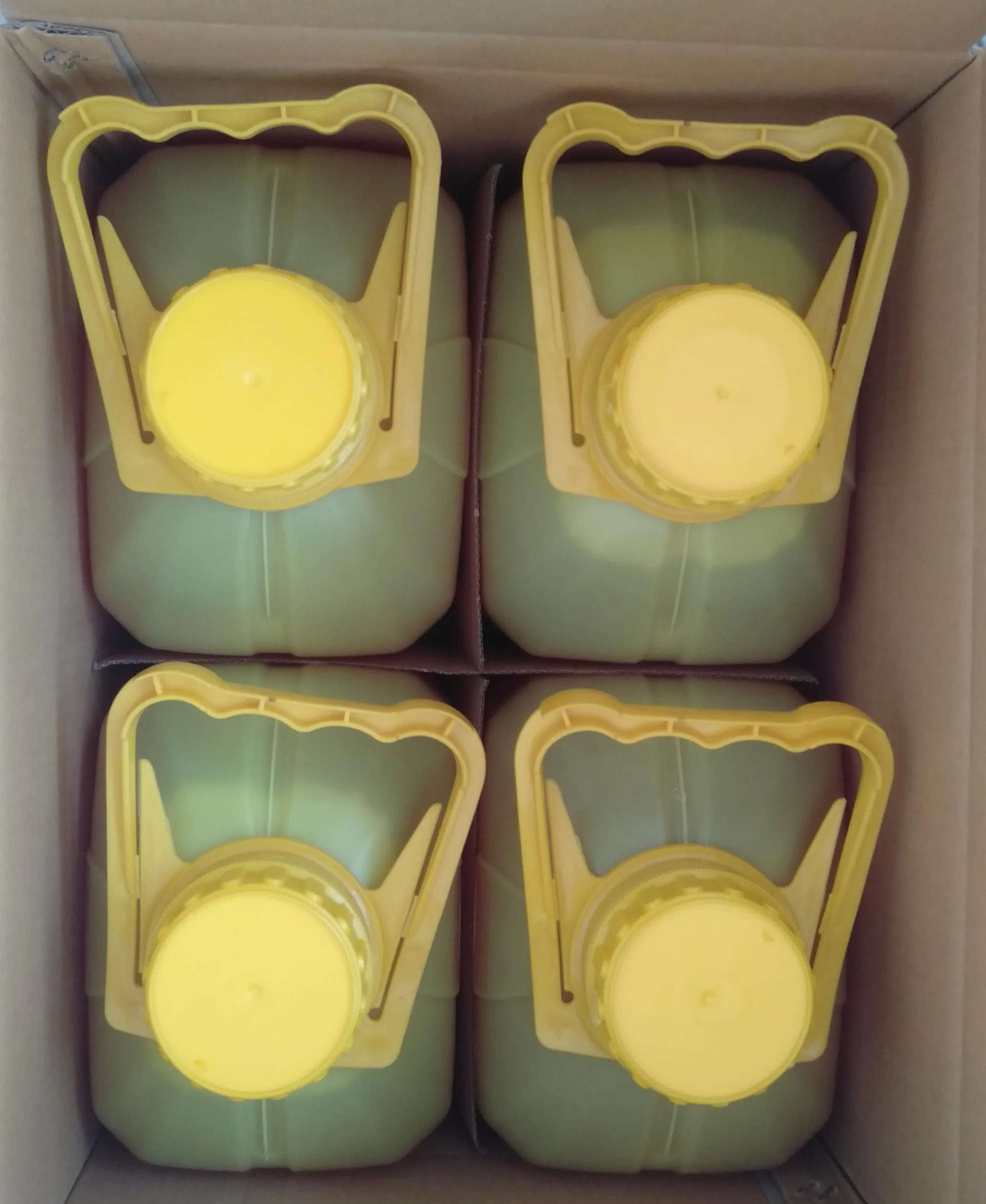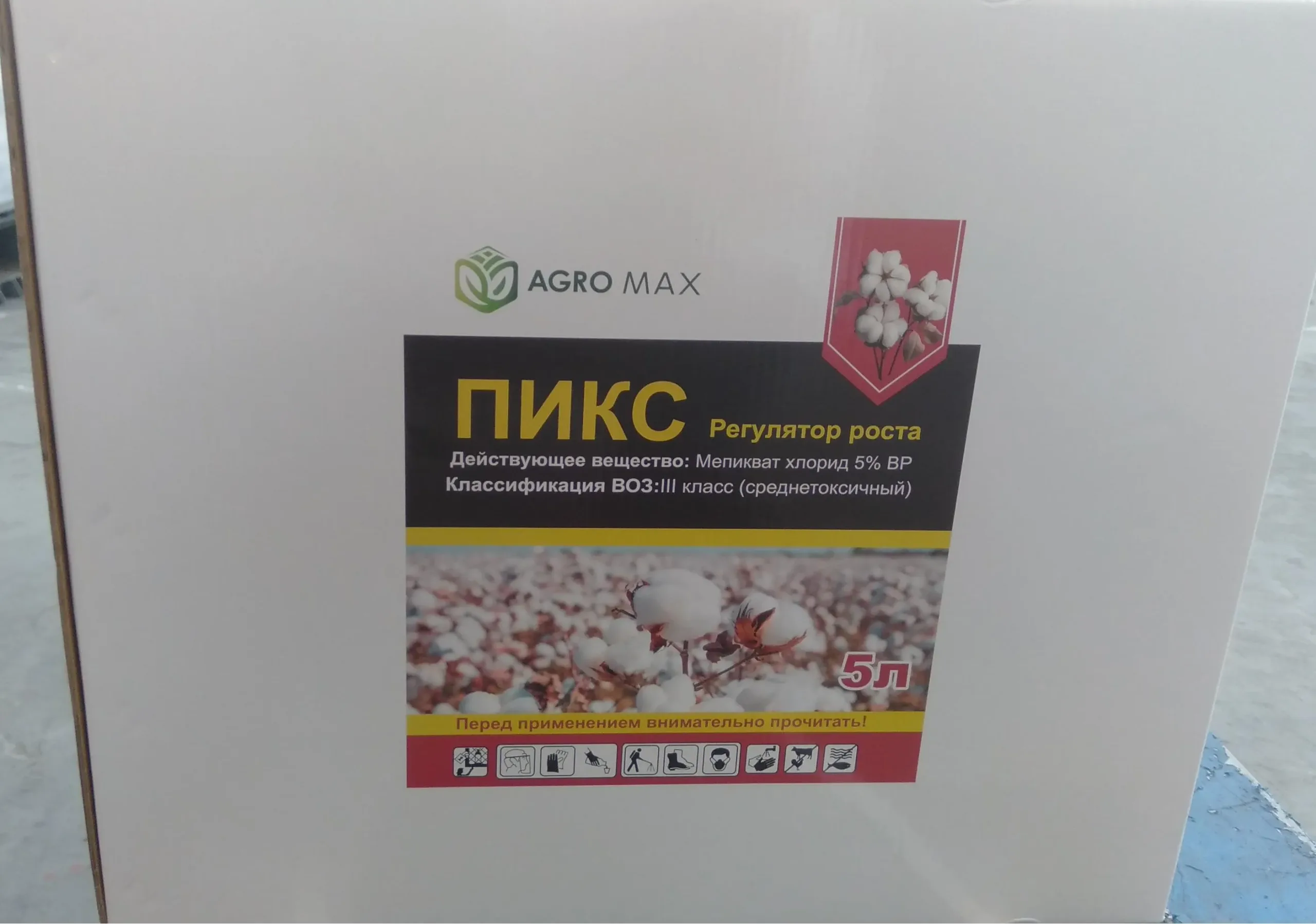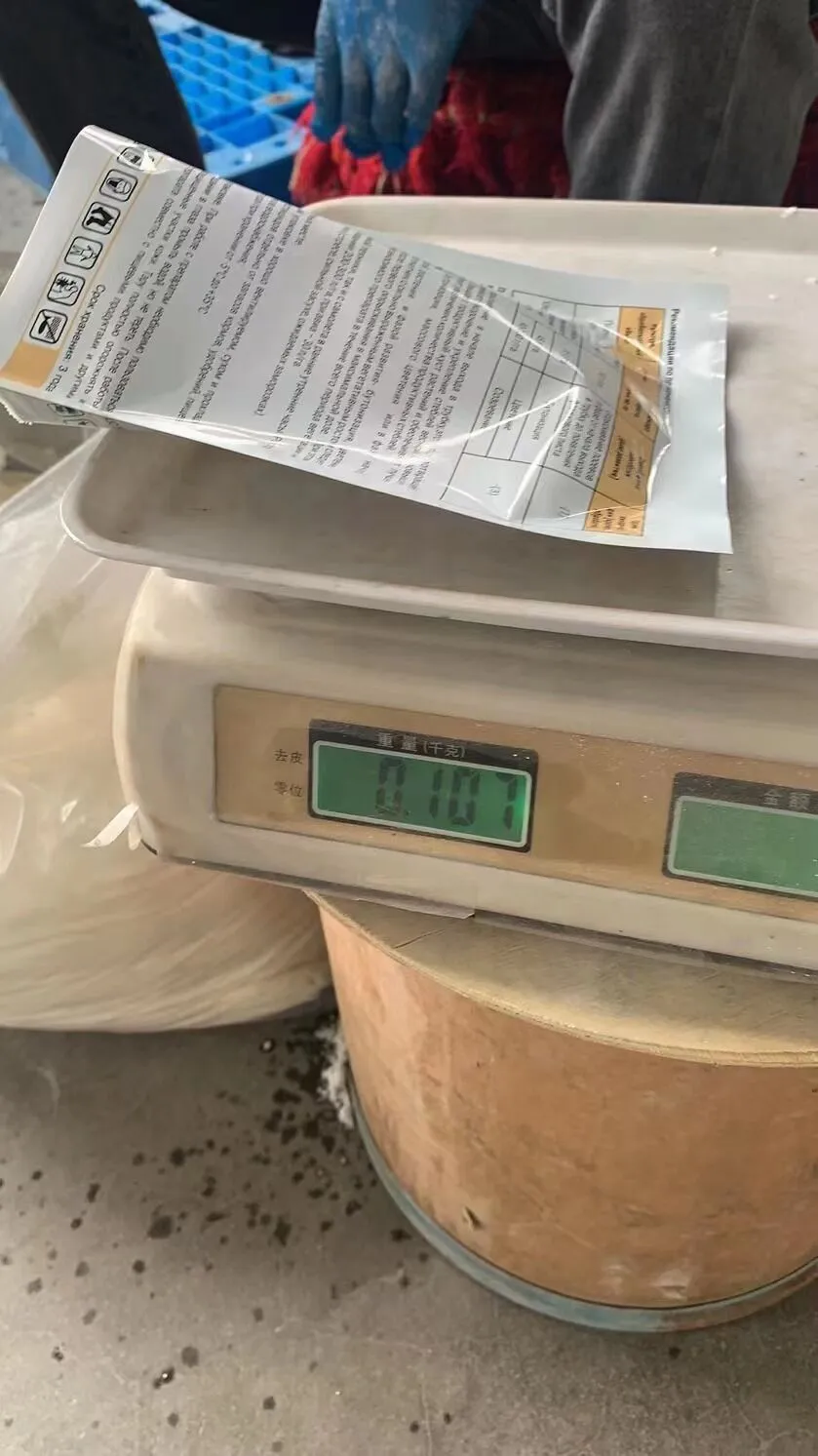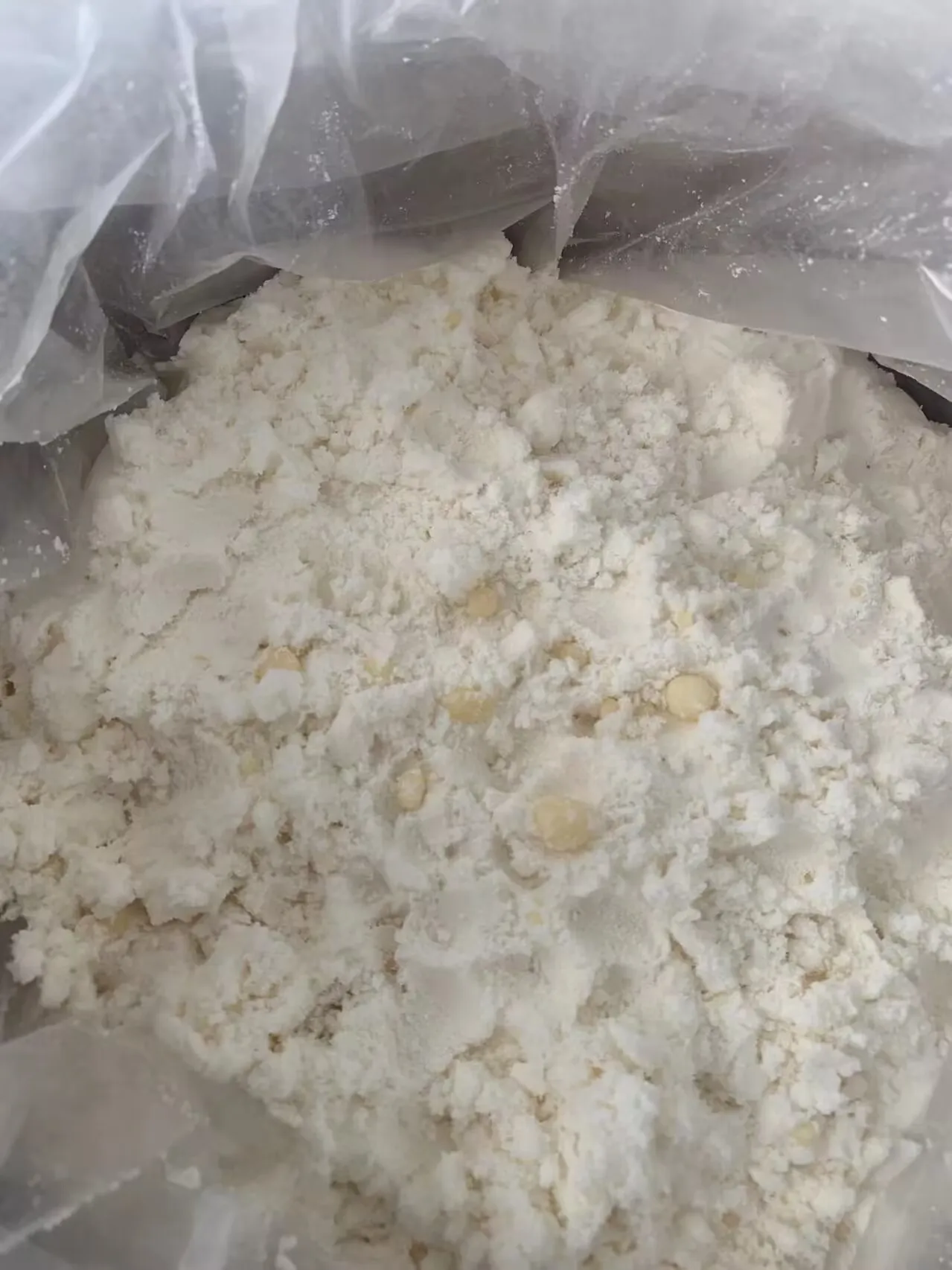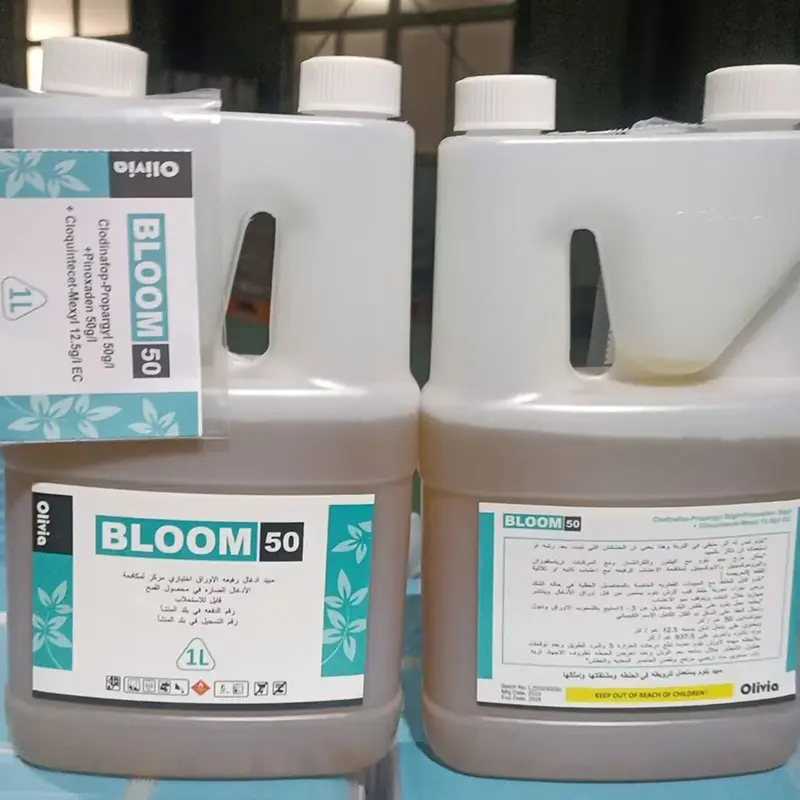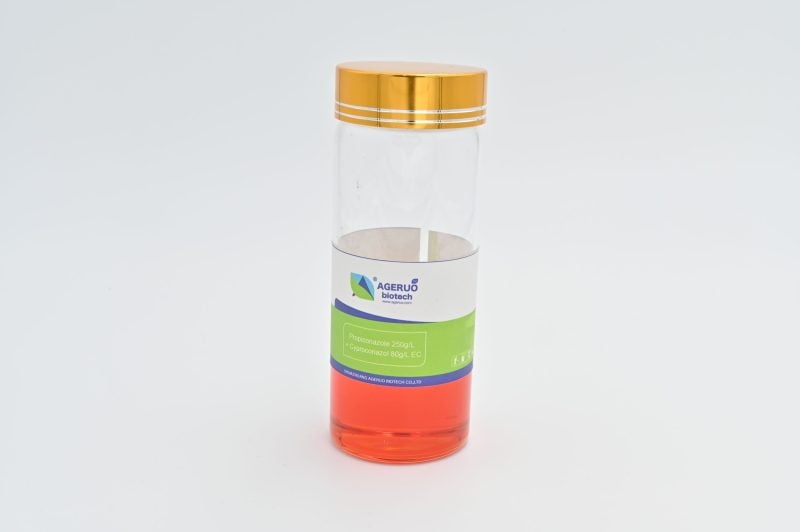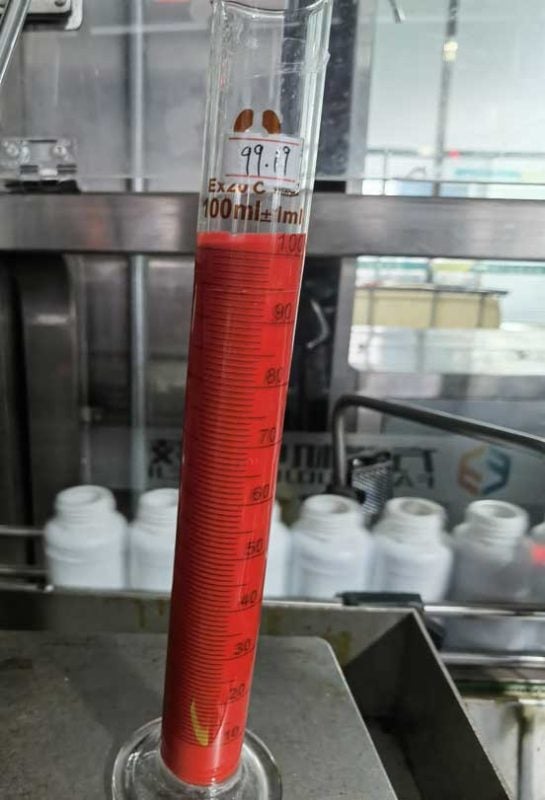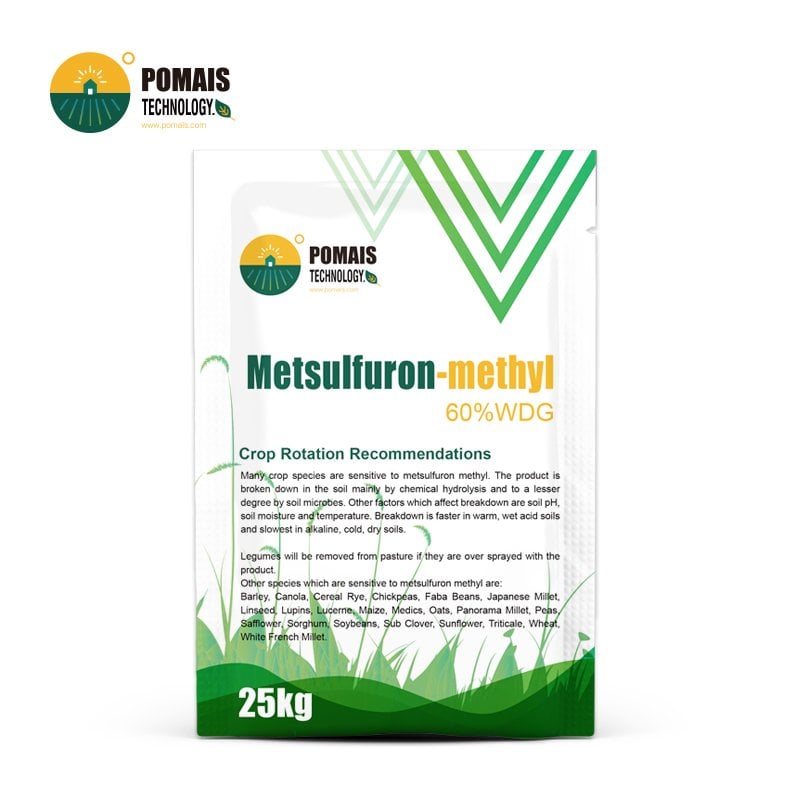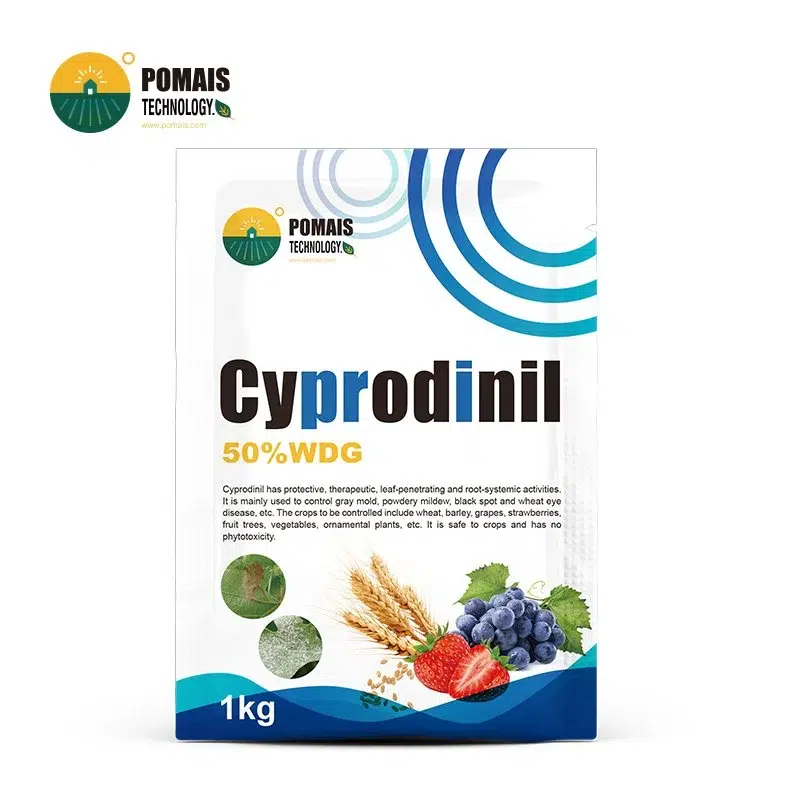Mepiquat Chloride Plant Growth Regulator
High-Efficiency Cotton Growth Control
Mepiquat Chloride is a widely used plant growth regulator designed to manage excessive vegetative growth and promote balanced development in crops, especially cotton. By inhibiting gibberellin biosynthesis, it helps shorten internodes, reduce lodging, and improve boll formation. It is ideal for precision crop management in cotton, wheat, and other field crops where canopy control and yield optimization are essential.
Available in various formulations including Mepiquat Chloride 5% Aqueous Solution, this PGR is highly compatible with most foliar nutrient and pesticide programs, making it a reliable component in modern Integrated Crop Management (ICM) and sustainable agriculture practices.
Formulations: 5% Aqueous Solution, 98% TC
Applications: Cotton, wheat, rice, peanuts, vegetables
Packaging: OEM customization available (100ml – 1L bottles)
MOQ: 500L | Sample: Available on request
- Designed for Professional Buyers & Bulk Orders
- This product is available for business purchase and large-scale distribution.
- We support custom packaging, labeling, and formulation to meet your market needs.
- Let’s build your brand together.

About Mepiquat Chloride Plant Growth Regulator
About Mepiquat Chloride Plant Growth Regulator
| Product Name | Mepiquat Chloride |
| Available Formulations | 5% SL, 25% SL, 98% TC |
| Active Ingredient | Mepiquat Chloride – Anti-gibberellin PGR |
| CAS Number | 24307-26-4 |
| Mode of Action | Inhibits gibberellic acid biosynthesis, reduces internode elongation |
| Primary Target Crops | Cotton, Rice, Wheat, Soybean, Barley, Corn, Ornamentals, Vegetables |
| Application Methods | Foliar spray using fine mist nozzles |
| Typical Dosage Range | 200–600 mL/ha (5% SL); 300–500 mL/ha (cereals); 50–100 mL/100L (ornamentals) |
| Formulation Appearance | Clear or light yellow liquid (SL), white crystalline powder (TC) |
| Packaging Options | 100 mL–20 L HDPE bottles; 25 kg fiber drums for TC |
| Rainfastness | Within 2–3 hours of application |
| Mixing Compatibility | Compatible with most foliar fertilizers, insecticides, and PGRs |
| Shelf Life | 24 months (in original sealed containers, 5–35°C) |
| GHS Classification | H302, H319, H335 – Warning |
| Safety Equipment Required | Gloves, goggles, protective clothing |
| POMAIS Services | OEM/ODM packaging, multilingual labeling, registration support, fast global shipping |
Mepiquat Chloride – Targeted Growth Regulation for Yield Optimization
Mepiquat Chloride is a systemic plant growth regulator (PGR) designed to optimize plant architecture, reduce lodging risk, and enhance crop yield quality through precise hormonal control. As an anti-gibberellin agent, it works by inhibiting the biosynthesis of gibberellic acid, the hormone responsible for excessive stem elongation. This leads to shorter internodes, stronger stems, improved root development, and better nutrient partitioning—factors that collectively contribute to healthier, more productive crops.
POMAIS offers mepiquat chloride in multiple high-quality formulations including 5% aqueous solution (widely used in foliar spraying) and 98% technical concentrate, suitable for downstream processing or use as an intermediate in other agrochemical products. Our mepiquat chloride is produced under strict quality control systems and adheres to global standards for purity, efficacy, and safety.
This product is particularly effective in cotton—where it regulates vegetative growth, boosts boll formation, and improves fiber quality. It is also widely used in rice, wheat, rapeseed, and soybeans, especially in regions prone to lodging and excessive vegetative growth during high-fertility or rainy seasons.
Key Functional Advantages:
- Restrains apical dominance and promotes balanced crop development.
- Enhances reproductive growth by redirecting plant energy toward seed, boll, or fruit production.
- Reduces crop lodging, particularly in tall cereals and cotton under dense planting conditions.
- Improves harvest uniformity, earliness, and commercial value of final yields.
- Increases plant resistance to abiotic stresses like wind, rain, and nutrient imbalance.
As a core component of modern agronomic strategies, Mepiquat Chloride is often integrated into IPM and nutrient management programs to regulate canopy size and improve mechanized harvesting outcomes.
Whether you are a formulation buyer, agrochemical distributor, or PGR brand owner, POMAIS delivers stable supply, tailored packaging, and compliance documentation (COA, TDS, MSDS, GLP reports) to support your registration or marketing activities across Asia, Latin America, and Africa.
Mode of Action – How Mepiquat Chloride Regulates Growth
Mepiquat Chloride functions primarily as an anti-gibberellin plant growth regulator, targeting the gibberellin biosynthesis pathway within plant cells. Gibberellins are hormones that stimulate stem elongation, cell division, and vegetative growth. By inhibiting their production, mepiquat chloride effectively slows down excessive shoot growth and encourages a shift in plant energy allocation from vegetative tissues toward reproductive development.
Mechanism Summary:
- Inhibits gibberellic acid biosynthesis in meristematic regions.
- Reduces internodal cell elongation, resulting in shorter, sturdier stems.
- Promotes assimilate partitioning toward fruit, seed, or boll development.
- Enhances root system growth and nutrient uptake capacity.
- Improves lodging resistance in cereals and cotton by strengthening basal stem tissues.
Unlike contact-type products, mepiquat chloride is absorbed through leaves and stems, then translocated systemically throughout the plant. This allows for broad, even effect with foliar applications, especially in crops such as cotton, rice, and soybeans where uniform growth regulation is critical.
This mechanism makes mepiquat chloride a vital tool for managing crop uniformity, stress resistance, and yield predictability, especially under high-input agricultural systems.
Target Crops & Use Scenarios – Maximize Yield with Precision Growth Control
Mepiquat chloride is widely recognized for its efficacy in regulating excessive vegetative growth and promoting reproductive development across a broad range of crops. Its consistent performance makes it a preferred plant growth regulator in intensive farming systems worldwide.
Primary Crops Treated with Mepiquat Chloride:
- Cotton: Delays excessive shoot elongation, promotes boll setting, improves boll retention, and enhances harvest uniformity. Especially effective when used during squaring and early boll formation stages.
- Rice: Controls plant height to reduce lodging in high-yielding hybrid and inbred varieties.
- Wheat & Barley: Increases stem stiffness and lodging resistance, particularly under dense planting or high nitrogen input.
- Soybean: Improves pod set and canopy uniformity, ensuring even maturation for mechanized harvest.
- Corn (Maize): Enhances root development in early stages and promotes energy allocation toward ear development.
- Ornamental Plants: Controls internodal elongation, improves aesthetic quality, and simplifies maintenance in commercial greenhouse production.
- Oilseed Rape (Canola): Reduces lodging risk and promotes stronger stalk structure.
- Vegetables (e.g., tomato, pepper): Promotes flower and fruit development while preventing vegetative overgrowth.
Typical Agricultural Use Scenarios:
- High-input cotton farms looking for yield optimization and boll retention under plant growth pressure.
- Hybrid rice systems requiring height control for wind resistance and uniform ripening.
- Cereal grain production where lodging risks due to nitrogen fertilization are a concern.
- Ornamental nurseries and greenhouses needing precise height control and compact form development.
Whether used in open fields or controlled environments, mepiquat chloride 5 aqueous solution offers versatile application potential to enhance crop management, reduce labor interventions, and support high-efficiency farming.
Application Methods & Recommended Dosage – Precision Dosing for Effective Growth Regulation
Mepiquat chloride should be applied as a foliar spray and tailored to crop type, growth stage, and desired outcome. Its aqueous solution formulations (such as mepiquat chloride 5%) are designed for easy dilution and uniform coverage, ensuring consistent performance in both large-scale and smallholder agricultural systems.
General Application Guidelines:
| Crop | Application Timing | Recommended Dosage | Notes |
|---|---|---|---|
| Cotton | At squaring to early boll formation | 200–600 mL/ha of mepiquat chloride 5% SL | Apply at 15–20 days after first square appearance; repeat as needed |
| Rice | Tillering stage | 200–400 mL/ha | Apply once to control excessive tillering and prevent lodging |
| Wheat/Barley | Early stem elongation stage (Zadoks 30–32) | 300–500 mL/ha | Enhances lodging resistance under high nitrogen conditions |
| Soybean | Pre-flowering stage | 250–400 mL/ha | Improves pod uniformity and reduces shading |
| Corn | V4 to V6 growth stage | 300–500 mL/ha | Supports early vigor and balanced development |
| Ornamentals | As needed during vegetative growth | 50–100 mL/100 L water | Use low concentration for compact structure; avoid flowering disruption |
| Oilseed Rape | Elongation stage | 300–500 mL/ha | Improves stem strength and resistance to wind lodging |
Application Tips:
- Use fine mist sprayers to ensure uniform leaf coverage.
- For best results, apply during cooler parts of the day (early morning or late afternoon).
- Avoid spraying during periods of stress (drought, frost, or disease).
- Repeat applications may be needed based on crop response and environmental conditions.
By integrating mepiquat chloride aqueous solution into your crop management plan, you enable better canopy structure, enhanced fruiting, and consistent harvest maturity—key factors in modern, efficient agriculture.
Formulation Types & Product Availability – Flexible Solutions for Diverse Agronomic Needs
To accommodate various field conditions, regulatory environments, and user preferences, POMAIS supplies Mepiquat Chloride in multiple formulation types and technical grades. All variants are manufactured under strict quality control and are optimized for ease of use, storage stability, and consistent field efficacy.
Available Formulations:
- Mepiquat Chloride 5% SL (Aqueous Solution)
A standard and highly adopted formulation suitable for foliar spraying in cotton, rice, cereals, and horticultural crops. This liquid formulation provides reliable plant growth regulation with excellent crop safety. - Mepiquat Chloride 25% SL
A concentrated version designed for markets requiring lower application volumes or tailored tank mix flexibility. Suitable for professional agricultural users and commercial farms. - Mepiquat Chloride 98% TC (Technical Concentrate)
Provided for agrochemical formulators and repackers. This technical grade is ideal for countries requiring in-country formulation registration or bulk production.
Packaging and Supply Options:
| Formulation | Concentration | Appearance | Application | Packaging Options |
|---|---|---|---|---|
| Soluble Liquid (SL) | 5%, 25% | Clear or light yellow liquid | Direct foliar spray | 100ml, 250ml, 500ml, 1L, 5L, 20L HDPE bottles |
| Technical Concentrate (TC) | 98% | Off-white powder or crystals | Local formulation or repack | 25kg fiber drum, sealed with PE liner |
Production Capabilities:
- Stable monthly supply capacity for bulk and small-pack orders
- Custom formulation and concentration adjustment upon request
- Full OEM/ODM support, including multilingual labeling and branded packaging
- Comprehensive export documents: COA, MSDS, TDS, and registration dossiers
POMAIS ensures you receive dependable and flexible access to mepiquat chloride products that align with both field performance expectations and global distribution standards.
Tank Mix Compatibility & Application Precautions
Tank Mix Compatibility
Mepiquat Chloride demonstrates good compatibility with a wide range of agrochemical products, making it suitable for integrated application in modern crop management programs. It can be mixed with:
- Foliar fertilizers: To enhance nutrient uptake during vegetative growth
- Insecticides and fungicides: Commonly compatible for cotton and cereal crops, allowing for reduced spray frequency
- Other plant growth regulators: In specific cases where synergistic effects are desired
Note: Always conduct a small-scale jar test before large-scale mixing, especially when combining with EC or SC formulations, to verify physical stability and avoid precipitation or layering.
Application Precautions
To ensure safe and effective use of Mepiquat Chloride products, users should follow these key precautions:
- Weather Conditions: Avoid application during periods of drought stress or extreme heat, as plant response may be reduced.
- Growth Stage: Apply only during the appropriate crop growth stages to avoid over-suppression of vegetative development.
- Water Quality: Use clean, neutral-pH water for dilution to maintain chemical stability.
- Spray Equipment: Ensure no residue from previous incompatible tank mixtures remains in the sprayer. Use fine nozzles for uniform foliar coverage.
Crop-Specific Guidance
- In cotton, do not exceed the recommended cumulative dosage during early squaring to avoid yield suppression.
- For rice and wheat, avoid mixing with strong acids or alkalis that may degrade mepiquat chloride’s active ingredient.
- Avoid application near sensitive crops such as lettuce or greenhouse ornamentals unless field-tested compatibility is confirmed.
Operator Safety
- Wear chemical-resistant gloves, goggles, and protective clothing during handling and spraying.
- Do not eat, smoke, or drink while using the product. Wash hands thoroughly after handling.
- In case of accidental exposure or ingestion, seek medical attention and show the product label.
POMAIS provides detailed MSDS, COA, and usage protocols with every shipment to ensure safe handling and proper application of all mepiquat chloride formulations.
Regulatory Compliance & Safety Classification
Global Regulatory Status
Mepiquat Chloride is a widely approved plant growth regulator registered for agricultural use across numerous regulatory jurisdictions. It conforms to the key international pesticide management frameworks, including:
- FAO/WHO specifications for agricultural use
- European Union (EU) Regulation (EC) No 1107/2009 on plant protection products
- EPA (USA) registration under FIFRA for use on cotton, wheat, rice, and other approved crops
- China ICAMA registration, with full support documentation available from POMAIS
These certifications ensure that our mepiquat chloride formulations meet the necessary standards for quality, safety, and efficacy.
GHS Classification & Hazard Identification
According to the Globally Harmonized System (GHS) for classification and labeling, Mepiquat Chloride typically carries the following safety profile:
- Signal Word: Warning
- Hazard Statements:
- H302: Harmful if swallowed
- H319: Causes serious eye irritation
- H335: May cause respiratory irritation
- Precautionary Statements:
- P264: Wash hands thoroughly after handling
- P280: Wear protective gloves and eye protection
- P301 + P312: IF SWALLOWED: Call a POISON CENTER or doctor if you feel unwell
- P305 + P351 + P338: IF IN EYES: Rinse cautiously with water for several minutes
A full Safety Data Sheet (SDS) is provided for all POMAIS mepiquat chloride products, detailing physical properties, first aid measures, environmental hazards, and safe transport guidelines.
Storage & Transport Compliance
- UN Classification: Not classified as a hazardous good for ground or sea transport
- Shelf Life: 2 years under dry, shaded storage at ambient temperatures
- Labeling: Complies with international standards for chemical labeling, including CLP and OSHA
POMAIS ensures all packaging, labeling, and documentation conform to export and import regulatory requirements for mepiquat chloride in your destination market. Whether for bulk formulation or OEM packaging, we provide complete compliance support for customs clearance, safety handling, and end-user education.
Packaging Formats & OEM Services
At POMAIS, we understand that your packaging requirements are as unique as your market. Our mepiquat chloride formulations are available in a wide variety of packaging formats to meet both bulk supply needs and retail-ready product lines. Whether you are an agrochemical distributor, brand owner, or formulation partner, we offer tailored packaging solutions with full compliance and visual appeal.
Available Packaging Formats
- Bulk Packaging:
- 25 kg fiber drums with inner polyethylene lining
- 200 L HDPE drums for industrial supply chains
- Liquid Formulations (e.g., Mepiquat Chloride 5% SL):
- 100 mL, 250 mL, 500 mL, 1 L HDPE bottles
- 5 L and 20 L jerry cans
- Customized Units:
- Sachets, ampoules, and foil bags for targeted distribution or government tenders
All packaging complies with international transport and chemical safety standards, including UN-approved containers and moisture-resistant sealing.
OEM & Private Label Services
POMAIS offers complete OEM manufacturing and private label design for mepiquat chloride products, enabling you to build your brand with confidence:
- Custom Formulation Ratios to meet regional registration or climatic requirements
- Label & Branding Design aligned with your language, market regulations, and target crop segments
- Multilingual Documentation Support (MSDS, COA, TDS, registration dossiers)
- Anti-counterfeit Labeling, QR codes, and tamper-proof closures upon request
Our in-house design team ensures your product packaging communicates both professionalism and trust, while our production line maintains strict batch tracking and quality control from raw material to finished product.
Fast Turnaround & Global Shipping
We maintain streamlined production schedules to meet urgent demand:
- 7–10 days lead time for standard orders
- 15–20 days for full OEM customization, including packaging material production
Whether you’re supplying domestic markets or expanding into international trade, POMAIS is your reliable partner for flexible packaging and regulatory-ready growth regulator solutions.
Field Applications & Use Scenarios
Mepiquat chloride is widely used as a plant growth regulator across diverse agricultural production systems. Its ability to inhibit excessive vegetative growth, reduce plant height, and enhance reproductive development makes it particularly valuable in row crops, especially in environments with high nitrogen availability or dense planting systems.
Cotton Cultivation
In cotton farming, mepiquat chloride is a standard component of growth management programs:
- Purpose: To shorten internodes, reduce lodging risk, and promote earlier boll opening.
- Application Timing: From early squaring to mid-flowering stage, depending on plant height and weather conditions.
- Result: Improved canopy structure, better light penetration, and synchronized maturation, leading to higher lint yield and better fiber quality.
This use case is particularly effective in high-density cotton planting or under excess nitrogen conditions where vegetative growth threatens boll retention.
Cereal Crops (Wheat, Barley)
Although less common, mepiquat chloride is occasionally used in cereal crops:
- Purpose: To reduce lodging in high-fertility systems and support robust ear development.
- Typical Regions: Applied in areas where high nitrogen or irrigation increases plant height vulnerability to wind damage.
Ornamental Plants and Turfgrass
Mepiquat chloride finds selective application in ornamental horticulture and turf management:
- Use Cases:
- Control of excessive shoot elongation in greenhouse-grown plants.
- Maintaining compact plant forms in bedding plants and floral displays.
- Managing vertical growth in sports turf and landscape lawns.
Vegetable Crops & Oilseeds (Region-Specific)
In some regions (e.g., Southeast Asia and South America), mepiquat chloride has experimental or registered use in:
- Tomatoes & Peppers: Reducing vegetative biomass to improve fruiting ratio.
- Canola & Soybean: Supporting compact growth for mechanical harvesting systems.
FAQ – Common Questions About Mepiquat Chloride
Q1: What is the primary function of mepiquat chloride in crop production?
A: Mepiquat chloride functions as a plant growth regulator (PGR), mainly by inhibiting gibberellin biosynthesis. It restricts excessive vegetative growth, shortens internodes, and promotes reproductive development, improving yield structure in crops such as cotton and cereals.
Q2: Is mepiquat chloride safe for crops under high-temperature or drought stress?
A: Yes, when applied at the correct stage and dosage, mepiquat chloride helps crops adapt to environmental stress by improving resource allocation. However, avoid applying during extreme heat or drought stress peaks to prevent phytotoxicity.
Q3: Can I mix mepiquat chloride with other foliar fertilizers or pesticides?
A: Mepiquat chloride is generally compatible with most common foliar fertilizers and pesticides. However, it is recommended to conduct a small jar test or consult technical support before large-scale tank mixing to confirm chemical stability and leaf surface behavior.
Q4: How long does it take for mepiquat chloride to show visible effects on plants?
A: Effects typically begin to appear within 3–7 days post-application, including reduced elongation and more compact growth habit. Full physiological impact becomes evident in 10–14 days depending on temperature and plant metabolism.
Q5: What is the shelf life of mepiquat chloride formulations?
A: Most mepiquat chloride products have a shelf life of 2 years when stored in original, sealed containers under cool and dry conditions, away from direct sunlight.
Q6: Is mepiquat chloride suitable for use in organic farming systems?
A: No. Mepiquat chloride is a synthetic plant growth regulator and is not approved for organic agriculture under current international organic standards.
Q7: What precautions should be taken during application?
A: Operators should wear appropriate protective gear, avoid contact with skin or eyes, and prevent drift onto non-target crops. Always follow the application instructions on the label and adhere to local safety regulations.
Why Choose POMAIS as Your Mepiquat Chloride Supplier
At POMAIS, we are not just a manufacturer — we are your reliable partner in agricultural success. Here’s why global distributors and agrochemical brands trust us as their mepiquat chloride supplier:
- Consistent Quality
Every batch of mepiquat chloride we produce meets rigorous QC standards, with HPLC analysis, moisture control, and purity assurance up to 98% for TC and consistent formulation stability across SL grades. - Formulation Versatility
Whether you need mepiquat chloride 5% aqueous solution for foliar application or concentrated technical for your own blending, we offer a complete range of formulations with guaranteed solubility and homogeneity. - Customized OEM/ODM Services
From label design to packaging materials, we support brand owners with flexible OEM production, multilingual labeling, and anti-counterfeit packaging technologies that help your product stand out in competitive markets. - Technical Support & Regulatory Guidance
Our experienced technical team can assist with local pesticide registration dossiers, TDS/MSDS/COA documentation, and compliance consulting for markets in Asia, Africa, LATAM, and Eastern Europe. - Efficient Global Logistics
With a well-developed supply chain, we ensure fast lead times (10–15 days for regular orders) and support multimodal transport — including sea, air, and railway — with full export documentation. - Proven Market Experience
Our mepiquat chloride products are already distributed across cotton-producing regions in Pakistan, Central Asia, Egypt, and South America, with proven field performance and dealer satisfaction.
Partner with POMAIS to gain not just a supplier — but a strategic extension of your brand and business operations.
Start Your Partnership with POMAIS Today
Looking for a dependable source of mepiquat chloride formulations that meet global standards and business expectations? At POMAIS, we deliver not only quality products but also complete service solutions — from formulation to branding to export logistics.
Whether you’re a distributor, importer, or private label brand, we are ready to support your product portfolio with stable supply, competitive pricing, and technical expertise.
Contact us today to request a quote, explore OEM options, or start your product registration journey. Let’s grow your business together — efficiently and confidently.
| Product Name | Mepiquat Chloride |
| Available Formulations | 5% SL, 25% SL, 98% TC |
| Active Ingredient | Mepiquat Chloride – Anti-gibberellin PGR |
| CAS Number | 24307-26-4 |
| Mode of Action | Inhibits gibberellic acid biosynthesis, reduces internode elongation |
| Primary Target Crops | Cotton, Rice, Wheat, Soybean, Barley, Corn, Ornamentals, Vegetables |
| Application Methods | Foliar spray using fine mist nozzles |
| Typical Dosage Range | 200–600 mL/ha (5% SL); 300–500 mL/ha (cereals); 50–100 mL/100L (ornamentals) |
| Formulation Appearance | Clear or light yellow liquid (SL), white crystalline powder (TC) |
| Packaging Options | 100 mL–20 L HDPE bottles; 25 kg fiber drums for TC |
| Rainfastness | Within 2–3 hours of application |
| Mixing Compatibility | Compatible with most foliar fertilizers, insecticides, and PGRs |
| Shelf Life | 24 months (in original sealed containers, 5–35°C) |
| GHS Classification | H302, H319, H335 – Warning |
| Safety Equipment Required | Gloves, goggles, protective clothing |
| POMAIS Services | OEM/ODM packaging, multilingual labeling, registration support, fast global shipping |
Mepiquat Chloride – Targeted Growth Regulation for Yield Optimization
Mepiquat Chloride is a systemic plant growth regulator (PGR) designed to optimize plant architecture, reduce lodging risk, and enhance crop yield quality through precise hormonal control. As an anti-gibberellin agent, it works by inhibiting the biosynthesis of gibberellic acid, the hormone responsible for excessive stem elongation. This leads to shorter internodes, stronger stems, improved root development, and better nutrient partitioning—factors that collectively contribute to healthier, more productive crops.
POMAIS offers mepiquat chloride in multiple high-quality formulations including 5% aqueous solution (widely used in foliar spraying) and 98% technical concentrate, suitable for downstream processing or use as an intermediate in other agrochemical products. Our mepiquat chloride is produced under strict quality control systems and adheres to global standards for purity, efficacy, and safety.
This product is particularly effective in cotton—where it regulates vegetative growth, boosts boll formation, and improves fiber quality. It is also widely used in rice, wheat, rapeseed, and soybeans, especially in regions prone to lodging and excessive vegetative growth during high-fertility or rainy seasons.
Key Functional Advantages:
- Restrains apical dominance and promotes balanced crop development.
- Enhances reproductive growth by redirecting plant energy toward seed, boll, or fruit production.
- Reduces crop lodging, particularly in tall cereals and cotton under dense planting conditions.
- Improves harvest uniformity, earliness, and commercial value of final yields.
- Increases plant resistance to abiotic stresses like wind, rain, and nutrient imbalance.
As a core component of modern agronomic strategies, Mepiquat Chloride is often integrated into IPM and nutrient management programs to regulate canopy size and improve mechanized harvesting outcomes.
Whether you are a formulation buyer, agrochemical distributor, or PGR brand owner, POMAIS delivers stable supply, tailored packaging, and compliance documentation (COA, TDS, MSDS, GLP reports) to support your registration or marketing activities across Asia, Latin America, and Africa.
Mode of Action – How Mepiquat Chloride Regulates Growth
Mepiquat Chloride functions primarily as an anti-gibberellin plant growth regulator, targeting the gibberellin biosynthesis pathway within plant cells. Gibberellins are hormones that stimulate stem elongation, cell division, and vegetative growth. By inhibiting their production, mepiquat chloride effectively slows down excessive shoot growth and encourages a shift in plant energy allocation from vegetative tissues toward reproductive development.
Mechanism Summary:
- Inhibits gibberellic acid biosynthesis in meristematic regions.
- Reduces internodal cell elongation, resulting in shorter, sturdier stems.
- Promotes assimilate partitioning toward fruit, seed, or boll development.
- Enhances root system growth and nutrient uptake capacity.
- Improves lodging resistance in cereals and cotton by strengthening basal stem tissues.
Unlike contact-type products, mepiquat chloride is absorbed through leaves and stems, then translocated systemically throughout the plant. This allows for broad, even effect with foliar applications, especially in crops such as cotton, rice, and soybeans where uniform growth regulation is critical.
This mechanism makes mepiquat chloride a vital tool for managing crop uniformity, stress resistance, and yield predictability, especially under high-input agricultural systems.
Target Crops & Use Scenarios – Maximize Yield with Precision Growth Control
Mepiquat chloride is widely recognized for its efficacy in regulating excessive vegetative growth and promoting reproductive development across a broad range of crops. Its consistent performance makes it a preferred plant growth regulator in intensive farming systems worldwide.
Primary Crops Treated with Mepiquat Chloride:
- Cotton: Delays excessive shoot elongation, promotes boll setting, improves boll retention, and enhances harvest uniformity. Especially effective when used during squaring and early boll formation stages.
- Rice: Controls plant height to reduce lodging in high-yielding hybrid and inbred varieties.
- Wheat & Barley: Increases stem stiffness and lodging resistance, particularly under dense planting or high nitrogen input.
- Soybean: Improves pod set and canopy uniformity, ensuring even maturation for mechanized harvest.
- Corn (Maize): Enhances root development in early stages and promotes energy allocation toward ear development.
- Ornamental Plants: Controls internodal elongation, improves aesthetic quality, and simplifies maintenance in commercial greenhouse production.
- Oilseed Rape (Canola): Reduces lodging risk and promotes stronger stalk structure.
- Vegetables (e.g., tomato, pepper): Promotes flower and fruit development while preventing vegetative overgrowth.
Typical Agricultural Use Scenarios:
- High-input cotton farms looking for yield optimization and boll retention under plant growth pressure.
- Hybrid rice systems requiring height control for wind resistance and uniform ripening.
- Cereal grain production where lodging risks due to nitrogen fertilization are a concern.
- Ornamental nurseries and greenhouses needing precise height control and compact form development.
Whether used in open fields or controlled environments, mepiquat chloride 5 aqueous solution offers versatile application potential to enhance crop management, reduce labor interventions, and support high-efficiency farming.
Application Methods & Recommended Dosage – Precision Dosing for Effective Growth Regulation
Mepiquat chloride should be applied as a foliar spray and tailored to crop type, growth stage, and desired outcome. Its aqueous solution formulations (such as mepiquat chloride 5%) are designed for easy dilution and uniform coverage, ensuring consistent performance in both large-scale and smallholder agricultural systems.
General Application Guidelines:
| Crop | Application Timing | Recommended Dosage | Notes |
|---|---|---|---|
| Cotton | At squaring to early boll formation | 200–600 mL/ha of mepiquat chloride 5% SL | Apply at 15–20 days after first square appearance; repeat as needed |
| Rice | Tillering stage | 200–400 mL/ha | Apply once to control excessive tillering and prevent lodging |
| Wheat/Barley | Early stem elongation stage (Zadoks 30–32) | 300–500 mL/ha | Enhances lodging resistance under high nitrogen conditions |
| Soybean | Pre-flowering stage | 250–400 mL/ha | Improves pod uniformity and reduces shading |
| Corn | V4 to V6 growth stage | 300–500 mL/ha | Supports early vigor and balanced development |
| Ornamentals | As needed during vegetative growth | 50–100 mL/100 L water | Use low concentration for compact structure; avoid flowering disruption |
| Oilseed Rape | Elongation stage | 300–500 mL/ha | Improves stem strength and resistance to wind lodging |
Application Tips:
- Use fine mist sprayers to ensure uniform leaf coverage.
- For best results, apply during cooler parts of the day (early morning or late afternoon).
- Avoid spraying during periods of stress (drought, frost, or disease).
- Repeat applications may be needed based on crop response and environmental conditions.
By integrating mepiquat chloride aqueous solution into your crop management plan, you enable better canopy structure, enhanced fruiting, and consistent harvest maturity—key factors in modern, efficient agriculture.
Formulation Types & Product Availability – Flexible Solutions for Diverse Agronomic Needs
To accommodate various field conditions, regulatory environments, and user preferences, POMAIS supplies Mepiquat Chloride in multiple formulation types and technical grades. All variants are manufactured under strict quality control and are optimized for ease of use, storage stability, and consistent field efficacy.
Available Formulations:
- Mepiquat Chloride 5% SL (Aqueous Solution)
A standard and highly adopted formulation suitable for foliar spraying in cotton, rice, cereals, and horticultural crops. This liquid formulation provides reliable plant growth regulation with excellent crop safety. - Mepiquat Chloride 25% SL
A concentrated version designed for markets requiring lower application volumes or tailored tank mix flexibility. Suitable for professional agricultural users and commercial farms. - Mepiquat Chloride 98% TC (Technical Concentrate)
Provided for agrochemical formulators and repackers. This technical grade is ideal for countries requiring in-country formulation registration or bulk production.
Packaging and Supply Options:
| Formulation | Concentration | Appearance | Application | Packaging Options |
|---|---|---|---|---|
| Soluble Liquid (SL) | 5%, 25% | Clear or light yellow liquid | Direct foliar spray | 100ml, 250ml, 500ml, 1L, 5L, 20L HDPE bottles |
| Technical Concentrate (TC) | 98% | Off-white powder or crystals | Local formulation or repack | 25kg fiber drum, sealed with PE liner |
Production Capabilities:
- Stable monthly supply capacity for bulk and small-pack orders
- Custom formulation and concentration adjustment upon request
- Full OEM/ODM support, including multilingual labeling and branded packaging
- Comprehensive export documents: COA, MSDS, TDS, and registration dossiers
POMAIS ensures you receive dependable and flexible access to mepiquat chloride products that align with both field performance expectations and global distribution standards.
Tank Mix Compatibility & Application Precautions
Tank Mix Compatibility
Mepiquat Chloride demonstrates good compatibility with a wide range of agrochemical products, making it suitable for integrated application in modern crop management programs. It can be mixed with:
- Foliar fertilizers: To enhance nutrient uptake during vegetative growth
- Insecticides and fungicides: Commonly compatible for cotton and cereal crops, allowing for reduced spray frequency
- Other plant growth regulators: In specific cases where synergistic effects are desired
Note: Always conduct a small-scale jar test before large-scale mixing, especially when combining with EC or SC formulations, to verify physical stability and avoid precipitation or layering.
Application Precautions
To ensure safe and effective use of Mepiquat Chloride products, users should follow these key precautions:
- Weather Conditions: Avoid application during periods of drought stress or extreme heat, as plant response may be reduced.
- Growth Stage: Apply only during the appropriate crop growth stages to avoid over-suppression of vegetative development.
- Water Quality: Use clean, neutral-pH water for dilution to maintain chemical stability.
- Spray Equipment: Ensure no residue from previous incompatible tank mixtures remains in the sprayer. Use fine nozzles for uniform foliar coverage.
Crop-Specific Guidance
- In cotton, do not exceed the recommended cumulative dosage during early squaring to avoid yield suppression.
- For rice and wheat, avoid mixing with strong acids or alkalis that may degrade mepiquat chloride’s active ingredient.
- Avoid application near sensitive crops such as lettuce or greenhouse ornamentals unless field-tested compatibility is confirmed.
Operator Safety
- Wear chemical-resistant gloves, goggles, and protective clothing during handling and spraying.
- Do not eat, smoke, or drink while using the product. Wash hands thoroughly after handling.
- In case of accidental exposure or ingestion, seek medical attention and show the product label.
POMAIS provides detailed MSDS, COA, and usage protocols with every shipment to ensure safe handling and proper application of all mepiquat chloride formulations.
Regulatory Compliance & Safety Classification
Global Regulatory Status
Mepiquat Chloride is a widely approved plant growth regulator registered for agricultural use across numerous regulatory jurisdictions. It conforms to the key international pesticide management frameworks, including:
- FAO/WHO specifications for agricultural use
- European Union (EU) Regulation (EC) No 1107/2009 on plant protection products
- EPA (USA) registration under FIFRA for use on cotton, wheat, rice, and other approved crops
- China ICAMA registration, with full support documentation available from POMAIS
These certifications ensure that our mepiquat chloride formulations meet the necessary standards for quality, safety, and efficacy.
GHS Classification & Hazard Identification
According to the Globally Harmonized System (GHS) for classification and labeling, Mepiquat Chloride typically carries the following safety profile:
- Signal Word: Warning
- Hazard Statements:
- H302: Harmful if swallowed
- H319: Causes serious eye irritation
- H335: May cause respiratory irritation
- Precautionary Statements:
- P264: Wash hands thoroughly after handling
- P280: Wear protective gloves and eye protection
- P301 + P312: IF SWALLOWED: Call a POISON CENTER or doctor if you feel unwell
- P305 + P351 + P338: IF IN EYES: Rinse cautiously with water for several minutes
A full Safety Data Sheet (SDS) is provided for all POMAIS mepiquat chloride products, detailing physical properties, first aid measures, environmental hazards, and safe transport guidelines.
Storage & Transport Compliance
- UN Classification: Not classified as a hazardous good for ground or sea transport
- Shelf Life: 2 years under dry, shaded storage at ambient temperatures
- Labeling: Complies with international standards for chemical labeling, including CLP and OSHA
POMAIS ensures all packaging, labeling, and documentation conform to export and import regulatory requirements for mepiquat chloride in your destination market. Whether for bulk formulation or OEM packaging, we provide complete compliance support for customs clearance, safety handling, and end-user education.
Packaging Formats & OEM Services
At POMAIS, we understand that your packaging requirements are as unique as your market. Our mepiquat chloride formulations are available in a wide variety of packaging formats to meet both bulk supply needs and retail-ready product lines. Whether you are an agrochemical distributor, brand owner, or formulation partner, we offer tailored packaging solutions with full compliance and visual appeal.
Available Packaging Formats
- Bulk Packaging:
- 25 kg fiber drums with inner polyethylene lining
- 200 L HDPE drums for industrial supply chains
- Liquid Formulations (e.g., Mepiquat Chloride 5% SL):
- 100 mL, 250 mL, 500 mL, 1 L HDPE bottles
- 5 L and 20 L jerry cans
- Customized Units:
- Sachets, ampoules, and foil bags for targeted distribution or government tenders
All packaging complies with international transport and chemical safety standards, including UN-approved containers and moisture-resistant sealing.
OEM & Private Label Services
POMAIS offers complete OEM manufacturing and private label design for mepiquat chloride products, enabling you to build your brand with confidence:
- Custom Formulation Ratios to meet regional registration or climatic requirements
- Label & Branding Design aligned with your language, market regulations, and target crop segments
- Multilingual Documentation Support (MSDS, COA, TDS, registration dossiers)
- Anti-counterfeit Labeling, QR codes, and tamper-proof closures upon request
Our in-house design team ensures your product packaging communicates both professionalism and trust, while our production line maintains strict batch tracking and quality control from raw material to finished product.
Fast Turnaround & Global Shipping
We maintain streamlined production schedules to meet urgent demand:
- 7–10 days lead time for standard orders
- 15–20 days for full OEM customization, including packaging material production
Whether you’re supplying domestic markets or expanding into international trade, POMAIS is your reliable partner for flexible packaging and regulatory-ready growth regulator solutions.
Field Applications & Use Scenarios
Mepiquat chloride is widely used as a plant growth regulator across diverse agricultural production systems. Its ability to inhibit excessive vegetative growth, reduce plant height, and enhance reproductive development makes it particularly valuable in row crops, especially in environments with high nitrogen availability or dense planting systems.
Cotton Cultivation
In cotton farming, mepiquat chloride is a standard component of growth management programs:
- Purpose: To shorten internodes, reduce lodging risk, and promote earlier boll opening.
- Application Timing: From early squaring to mid-flowering stage, depending on plant height and weather conditions.
- Result: Improved canopy structure, better light penetration, and synchronized maturation, leading to higher lint yield and better fiber quality.
This use case is particularly effective in high-density cotton planting or under excess nitrogen conditions where vegetative growth threatens boll retention.
Cereal Crops (Wheat, Barley)
Although less common, mepiquat chloride is occasionally used in cereal crops:
- Purpose: To reduce lodging in high-fertility systems and support robust ear development.
- Typical Regions: Applied in areas where high nitrogen or irrigation increases plant height vulnerability to wind damage.
Ornamental Plants and Turfgrass
Mepiquat chloride finds selective application in ornamental horticulture and turf management:
- Use Cases:
- Control of excessive shoot elongation in greenhouse-grown plants.
- Maintaining compact plant forms in bedding plants and floral displays.
- Managing vertical growth in sports turf and landscape lawns.
Vegetable Crops & Oilseeds (Region-Specific)
In some regions (e.g., Southeast Asia and South America), mepiquat chloride has experimental or registered use in:
- Tomatoes & Peppers: Reducing vegetative biomass to improve fruiting ratio.
- Canola & Soybean: Supporting compact growth for mechanical harvesting systems.
FAQ – Common Questions About Mepiquat Chloride
Q1: What is the primary function of mepiquat chloride in crop production?
A: Mepiquat chloride functions as a plant growth regulator (PGR), mainly by inhibiting gibberellin biosynthesis. It restricts excessive vegetative growth, shortens internodes, and promotes reproductive development, improving yield structure in crops such as cotton and cereals.
Q2: Is mepiquat chloride safe for crops under high-temperature or drought stress?
A: Yes, when applied at the correct stage and dosage, mepiquat chloride helps crops adapt to environmental stress by improving resource allocation. However, avoid applying during extreme heat or drought stress peaks to prevent phytotoxicity.
Q3: Can I mix mepiquat chloride with other foliar fertilizers or pesticides?
A: Mepiquat chloride is generally compatible with most common foliar fertilizers and pesticides. However, it is recommended to conduct a small jar test or consult technical support before large-scale tank mixing to confirm chemical stability and leaf surface behavior.
Q4: How long does it take for mepiquat chloride to show visible effects on plants?
A: Effects typically begin to appear within 3–7 days post-application, including reduced elongation and more compact growth habit. Full physiological impact becomes evident in 10–14 days depending on temperature and plant metabolism.
Q5: What is the shelf life of mepiquat chloride formulations?
A: Most mepiquat chloride products have a shelf life of 2 years when stored in original, sealed containers under cool and dry conditions, away from direct sunlight.
Q6: Is mepiquat chloride suitable for use in organic farming systems?
A: No. Mepiquat chloride is a synthetic plant growth regulator and is not approved for organic agriculture under current international organic standards.
Q7: What precautions should be taken during application?
A: Operators should wear appropriate protective gear, avoid contact with skin or eyes, and prevent drift onto non-target crops. Always follow the application instructions on the label and adhere to local safety regulations.
Why Choose POMAIS as Your Mepiquat Chloride Supplier
At POMAIS, we are not just a manufacturer — we are your reliable partner in agricultural success. Here’s why global distributors and agrochemical brands trust us as their mepiquat chloride supplier:
- Consistent Quality
Every batch of mepiquat chloride we produce meets rigorous QC standards, with HPLC analysis, moisture control, and purity assurance up to 98% for TC and consistent formulation stability across SL grades. - Formulation Versatility
Whether you need mepiquat chloride 5% aqueous solution for foliar application or concentrated technical for your own blending, we offer a complete range of formulations with guaranteed solubility and homogeneity. - Customized OEM/ODM Services
From label design to packaging materials, we support brand owners with flexible OEM production, multilingual labeling, and anti-counterfeit packaging technologies that help your product stand out in competitive markets. - Technical Support & Regulatory Guidance
Our experienced technical team can assist with local pesticide registration dossiers, TDS/MSDS/COA documentation, and compliance consulting for markets in Asia, Africa, LATAM, and Eastern Europe. - Efficient Global Logistics
With a well-developed supply chain, we ensure fast lead times (10–15 days for regular orders) and support multimodal transport — including sea, air, and railway — with full export documentation. - Proven Market Experience
Our mepiquat chloride products are already distributed across cotton-producing regions in Pakistan, Central Asia, Egypt, and South America, with proven field performance and dealer satisfaction.
Partner with POMAIS to gain not just a supplier — but a strategic extension of your brand and business operations.
Start Your Partnership with POMAIS Today
Looking for a dependable source of mepiquat chloride formulations that meet global standards and business expectations? At POMAIS, we deliver not only quality products but also complete service solutions — from formulation to branding to export logistics.
Whether you’re a distributor, importer, or private label brand, we are ready to support your product portfolio with stable supply, competitive pricing, and technical expertise.
Contact us today to request a quote, explore OEM options, or start your product registration journey. Let’s grow your business together — efficiently and confidently.
Related Products
Latest News

